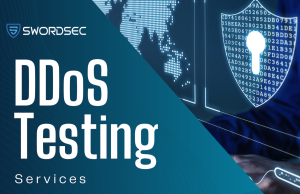What is DDoS?
Introduction:
In today’s digital landscape, cybersecurity is paramount, and understanding various types of cyber threats is crucial for businesses. One such prevalent threat is the Distributed Denial of Service (DDoS) attack. This article aims to demystify DDoS attacks, shedding light on how they operate and the potential impact they can have on businesses.
What is a DDoS Attack?
A Distributed Denial of Service (DDoS) attack is a malicious attempt to disrupt the normal traffic of a targeted server, service, or network by overwhelming the target or its surrounding infrastructure with a flood of Internet traffic. DDoS attacks leverage the power of multiple compromised computer systems as sources of attack traffic, often involving computers and other networked resources such as IoT devices.


Dive into the depths of SwordSec’s DDoS simulation testing capabilities with our comprehensive datasheet. Understand the intricacies of our testing approach, detailed package options, and how we meticulously evaluate your system’s resilience to DDoS attacks.

- Volume-based Attacks: These aim to saturate the bandwidth of the targeted site and include ICMP floods, UDP floods, and other spoofed-packet floods.
- Protocol Attacks: These consume actual server resources or those of intermediate communication equipment, such as firewalls and load balancers. They include SYN floods, fragmented packet attacks, and Ping of Death.
- Application Layer Attacks: These target the web application layer with the aim to crash the web server. They include GET/POST floods and attacks that target Apache, Nginx, Windows, or OpenBSD vulnerabilities.

Packages
Book a Consultation
FAQ
Will the targets be our own?
Yes, the targets will either be your own domain/IP, which will require verification, or those belonging to your client. Using client targets requires their permission and relevant validation processes.
How long does the DDoS test take?
The duration of the test is standardized across all our packages to ensure a focused and efficient assessment. Each DDoS testing session, regardless of the package selected, is conducted within a maximum timeframe of 1 hour. This allows us to deliver precise and actionable insights within a compact and effective testing period.
What types of attacks are included in your tests?
Our tests cover a wide range of attacks, from basic types like SYN Flood, Ping of Death, HTTP GET/POST Flood, to advanced types like UDP Flood, ICMP Flood, SSL Flood, and even complex attacks like DNS Amplification, NTP Amplification, and Layer 7 attacks.
What kind of reporting do you provide after the DDoS test?
Based on the test results, we provide a comprehensive report including attack analysis, security gaps, risk assessments, and improvement recommendations. The level of detail in the report varies depending on the package selected.
Will my system be harmed during the DDoS test?
Our DDoS tests are carefully planned and executed to ensure no harm comes to your systems. We closely monitor your systems throughout the test and can quickly intervene in any adverse situations.
Do we need to make any special preparations for the test?
Yes, some preparations may be required before the test. This typically involves configuring your firewalls and other defense mechanisms appropriately for the duration of the test. We provide a detailed checklist prior to the test to assist you.
Do you provide post-test support?
Yes, we provide support to our clients in evaluating the findings and implementing the recommended improvements after the test is completed. Specifically for our ‘GOLD’ package, we offer a one-time consultation and Advanced DDoS solution recommendations to enhance your cybersecurity posture.
What should I do after making a purchase?
Upon purchasing, you will receive an email containing a calendar link. From there, you can select the most suitable date and time to initiate a meeting with our technical team. During this meeting, you will be able to discuss and coordinate the test processes with our experts.